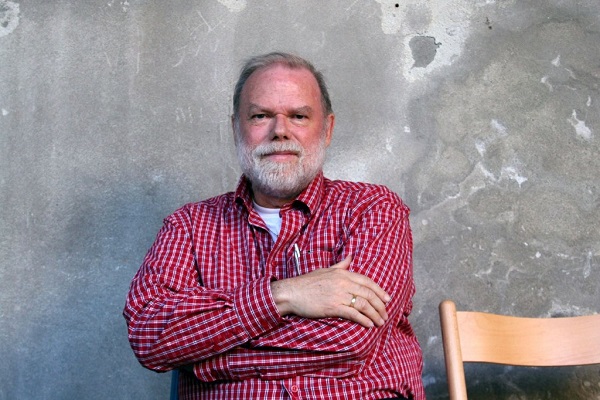Interview with Jim Forest (Jim Forest, Writer, Theologian)
3 Οκτωβρίου 2016
On the occasion of the presentation of his book ‘The Ladder of the Beatitudes’ in Greece on 10 October, the author and theologian Jim Forest has given an exclusive interview to Pemptousia, which we’re delighted to be able to air today.
Pemptousia: One of your books is about love to the enemy. Do you think this is Orthodoxy’s characteristic, it belongs to Christianity in general or it refers to any man who feels a deep sense of charity in him?
Jim Forest: If love of enemies is understood in a Christian sense, it refers to a non-sentimental attitude in which one sees in the other, even an enemy, the possibility of a changed relationship. It is not easy, for the Christian anymore than the non-Christian, to respond to an adversary in a non-hostile way, but history is full of examples of constructive rather than destructive response. For example consider this instance of what is sometimes referred to as a classic instance of “earthquake diplomacy.” On August 17, 1999, Turkey experienced a massive earthquake that severely affected many towns and cities, with the city of Izmit the most severely damaged. A second major earthquake occurred five days later. The official number of casualties was 17,000, although the actual number is thought to be more than double that. About a third-of-a-million people were left homeless.

To the world’s astonishment, Greece — historic enemy of Greece — was the first country to pledge aid and support to Turkey. Within hours of the earthquake, senior staff of the Greek Ministry of Foreign Affairs contacted their Turkish counterparts, then dispatched personal envoys to Turkey. The Greek Ministry of Public Order sent in a rescue team of twenty-four people with trained rescue dogs plus fire-extinguishing planes to help put out the huge blaze at an oil refinery. Greek medical teams followed — doctors and nurses plus tents, ambulances, medicine, water, clothes, food and blankets. The Greek Orthodox Church launched a major fund raising campaign for humanitarian relief. Throughout Greece, the Ministry of Health set up units for blood donations. The five largest municipalities of Greece sent a joint convoy with aid. When the Mayor of Athens came personally to visit earthquake sites, he was greeted at the Istanbul airport by the mayor. Both Greece’s official actions and the responses of ordinary Greeks were given wide coverage day after day in every newspaper and TV channel in Turkey. Turks were astounded by the compassionate Greek response to Turkey’s disaster.
As it happened, just weeks after the Turkish disaster, on September 7, 1999, Athens was hit by a powerful earthquake, the most devastating natural disaster in Greece in twenty years. While the death toll was relatively low, the damage to buildings and the infrastructure in some of the city’s northern and western suburbs was severe. This time Turkey responded — in fact Turkish aid was the first to reach Athens from outside Greece’s borders. Within thirteen hours a twenty-person rescue team was flown in by a military plane. The Greek consulates and embassy in Turkey had their phone lines jammed with Turks calling to find out whether they could donate blood. One Turk offered to donate his kidney for a “Greek in need.”
The very last thing our enemies imagine is that we could wish them well or do them well. Such events can radically change the script.
Pemptousia: You ‘ve been in Peace and social actions Movements before. Do you believe that the Orthodox Church can cover a man’s needs with an increased sensitivity in these areas?
Jim Forest: The Church can and does awaken our social conscience — one has only to pay attention to what we hear in readings and prayers at any and every liturgy. But there are obstacles as well. Too often we find, not only in Greece but in every country, that national identity is a more decisive factor than religious identity — the cross is made into a flag pole.
Pemptousia: We see you are staying socially active even today. How do you value that balances in Christian Orthodox life, spirituality with social action?
Jim Forest: Ideology and spiritual life are not the same thing. Many people who are socially active are motivated by their political ideology, but often that results in seeing the world around us with one eye closed. What you refer to as the “balances in Christian Orthodox life” can open both eyes.
Pemptousia: Ladder of Beatitudes reminds us the famous work of st. John of Sinai. What proportion do you see between the evangelical spirit and ascetic tradition?
Jim Forest: We live in a culture in which it is easy to value things more than people and relationships. Both St. John of Sinai’s 40-step ladder and what I call in my books the «Ladder of the Beatitudes» (just eight steps) are ladders of ascetic effort. In the case of the Beatitudes, the very first step is the acquisition of poverty of spirit, in other words the daily struggle not only to limit one’s material needs to essentials but the struggle to become free of the spirit of avarice.
Pemptousia: What can the word of Orthodoxy offer in the western world today and especially in a turbulent international environment?
Jim Forest: During the first procession at every Orthodox liturgy a book containing the four Gospels and nothing more is carried out of the sanctuary and placed — in fact enthroned — on the altar. The symbolism is both simple and dramatic. This small collection of the stories, sayings and actions of Jesus are intended by God to shape our lives and the way we relate to others. The key word is love, love of God and love of neighbor being inseparable. To the extent that Orthodox Christians bear witness to such love we make a positive contribution to the world around us.





